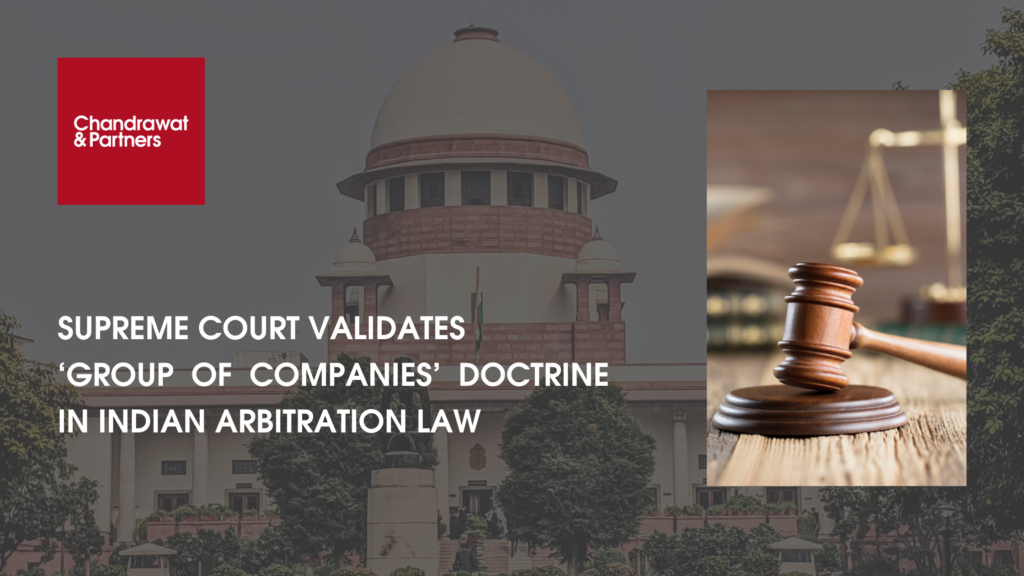Share :
Introduction:
In a groundbreaking legal development on December 6, 2023, a distinguished Constitution Bench of the Supreme Court, presided over by Chief Justice DY Chandrachud along with Justices Hrishikesh Roy, PS Narasimha, JB Pardiwala, and Manoj Misra, rendered a seminal verdict in the case of Cox and Kings Ltd v. SAP India Pvt Ltd. This landmark decision fundamentally addressed the nuanced complexities surrounding the applicability of the “group of companies” doctrine in Indian arbitration jurisprudence, providing pivotal insights into the binding nature of arbitration agreements on non-signatory entities.
kEY INSIGHTS
- Expanded Definition of Parties: The Court asserted that the definition of parties under Section 2(1)(h) in conjunction with Section 7 of the Arbitration and Conciliation Act, 1996, encompasses both signatory and non-signatory entities. This expansive interpretation significantly broadens the spectrum of entities subject to arbitration agreements.
- Consent Through Conduct: The judgment underscored the Court’s recognition that the conduct of non-signatory entities may constitute a valid indicator of their implicit consent to be bound by an arbitration agreement. The Court acknowledged that while a party’s signature remains a pivotal expression of consent, it is not the exclusive determinant of involvement in arbitration proceedings.
- Written Agreement Not Exclusive: In a departure from a rigid reading of Section 7, the Court clarified that the statutory requirement for a written arbitration agreement does not preclude the binding of non-signatory entities. The emphasis shifted towards establishing a defined legal relationship between signatories and non-signatories, coupled with being bound by the agreement.
- Retention of ‘Group of Companies’ Doctrine: The Court, recognizing the intricate nature of transactions involving multiple entities and agreements, affirmed the utility of the ‘group of companies’ doctrine. This doctrine considers the commercial relationships and interactions within a corporate group as pertinent factors in determining the intention of the parties in complex scenarios.
- Caution in Application: While upholding the ‘group of companies’ doctrine, the Court underscored the necessity for caution in its application. The mere affiliation within a corporate group does not automatically extend the reach of an arbitration agreement to non-signatory entities. Each case must undergo meticulous evaluation based on cumulative factors.
- Referral Stage and Arbitral Tribunal’s Role: The judgment outlined that at the referral stage, the referring court should defer to the Arbitral Tribunal to decide whether non-signatory entities are bound by the arbitration agreement. This underscores the tribunal’s pivotal role in delineating the scope of arbitration involving non-signatory entities.
Implications for Corporate Transactions
The ruling’s profound implications for corporate transactions are explored, emphasizing how the decision provides clarity in understanding the intentions of parties involved in intricate business arrangements. Legal practitioners gain valuable insights into the binding nature of arbitration agreements on both signatory and non-signatory entities in the realm of complex corporate structures.
Judicial Caution and Application in Practice
This section delves into the Court’s emphasis on judicial caution in applying the ‘group of companies’ doctrine. Practical implications are discussed, guiding legal professionals on the prudent invocation of the doctrine. The section also sheds light on the Court’s directive to entrust the determination of the binding nature of non-signatory entities to the Arbitral Tribunal, emphasizing procedural fairness and the tribunal’s pivotal role in deciding arbitration agreement scopes.
Conclusion
The Supreme Court’s verdict in Cox and Kings Ltd v. SAP India Pvt Ltd marks a defining moment in Indian arbitration law. As legal practitioners and corporate entities navigate the intricate landscape of arbitration agreements, this decision provides a comprehensive framework for understanding the binding nature of such agreements on both signatory and non-signatory entities. It reinforces the importance of judicial caution and procedural fairness in applying the ‘group of companies’ doctrine, setting a precedent for future arbitration cases in the complex realm of corporate transactions.
Our firm remains committed to vigilantly monitoring and analyzing developments in arbitration law, ensuring our clients receive comprehensive and strategic legal counsel tailored to their specific needs.
For more information or queries, please email us at
enquiries@chandrawatpartners.com





